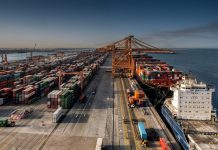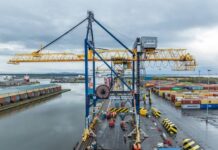
Marine terminal companies holding operating concessions at India’s major landlord ports now have an opportunity to better compete with private ports, an industry domain being increasingly dominated by the Adani Group.
The government has released revised draft policy guidelines allowing old terminals with operations on a build-operate-transfer (BOT) basis, who had been victims of a flawed pricing mechanism, to migrate from regulated service rates to a market-driven tariff regime.
“In the past, tariffs were regulated due to limited competitive landscape but the evolving market and competitive landscape necessitates deregulation,” the Indian Shipping Ministry said in its provisional document.
The ministry further noted: “The original objective of introducing the tariff regulations in 2005, inter alia, included safeguarding interest of users, while ensuring fair returns to the port and encouraging competition and efficiency.”
It went on to add: “The long-term objective outlined in the tariff guideline 2005 was competitive pricing. The market and the competitive landscape in the Indian port sector has since witnessed a significant shift.”
The Tariff Authority for Major Ports (TAMP) had been tasked with determining and approving tariff rates at public-private-partnership (PPP) terminal projects.
Royalty amounts mandated to be shared with landlord ports or the government had been the chief bone of contention or pain point, as competition intensified.
The PSA terminal at Tuticorin Port has borne the brunt of such lopsided contracts, with little relief from years of litigation.
On the other hand, private minor ports have the autonomy to fix their tariffs, gaining significant competitive advantages over BOT terminals. Here, Adani Ports has made steady inroads into the Indian container market, with its flagship Mundra Port the busiest in the country.
“The non-major ports presently account for about 45% of the traffic, and there is no parity in the tariff regulation mechanism between the major ports and the minor/non-major ports,” the ministry explained in its document.
“Thus, need was felt to address the disparity in differing regulations and tariff guidelines subsisting at major ports, in order to provide uniform user experience and ensuring level playing field for PPP operators by allowing them to play a greater role in determination of tariffs and better respond to competitive market forces.”
Amid tariff complications, port investments from other global leaders, particularly APMT, haven’t been that promising in recent years, with the exception of DP World, which recently won a new terminal concession at Kandla.
India has massive port plans in the offing, requiring a more consistent and pro-industry policy framework to propel private investment interest. A greenfield project, costing about US$ 10 billion, near Nhava Sheva, is the most notable one.
India has 12 major or government ports and more than 200 minor or non-major ports across its vast coastline of some 4,600 miles.
Jenny Daniel
Global Correspondent
Contact email: j.daniel@container-news.com





